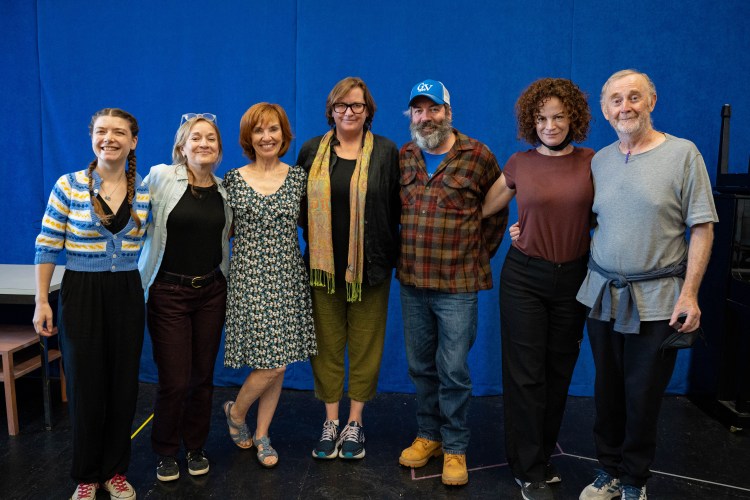As a nationally renowned novelist, memoirist, and playwright, Monica Wood knows how to deliver a log line. “Bud, Denise, and Suzanne have a big problem to solve,” she said, describing her new play. “They sold the family camp out from under their father when they thought he was dying. But then he didn’t.”
Saint Dad will kick off Portland Stage’s anniversary season full of laughter, tears, classics, and new works. It is the third of Wood’s three plays to debut at the theater, after Papermaker in 2015 and The Half Light in 2019—two of the Portland Stage’s best-selling shows of all time. Wood was reached via Zoom the week before rehearsals started.
Adams: Monica, this play sounds so juicy and I only got three sentences. What else can you say?
Wood: Now the camp is owned by this corporate type of woman from Boston, and she’s completely renovated it. So they are trying to convince her to act as a renter while they sort it out and break the news to dear, old dad. Who’s a horrible person, by the way.
Was this a play when you started thinking about it?
Yes. Sometimes I’m not sure whether something’s a play or a novel, but this was a play. I had the basic premise and wrote to end of Act 1 but then didn’t know where to go. So, I set it aside and wrote The Half Light in the meantime. Sometimes ideas need a long time to simmer. Because underlying the human, family dynamic there is a serious question about who gets to own what. About gentrification. This is happening rurally and in Portland. I mean, oh my gosh. I don’t know how long you’ve been here?
I grew up here so… yeah.
Well, there you go. I think it’s an interesting phenomenon and it’s one that really gets to my heart. And I’m a sucker for sibling stories. I’m one of five. Saint Dad is a comedy, but it has blue-collar vibes and issues. Like, Suzanne, the youngest, she’s the one that “got out.” She’s a professor at a college in Boston but she feels as if she does not belong there. She has one foot in two worlds, and it takes its toll on her. Everybody holding things back. I’m being a little cagey because there’s a lot of revelation in Act Two.
How does your process for writing a play and writing a novel differ?
Playwriting is so different from novel writing because the only way to find out if it’s working is to have people act it out and watch it. It’s completely mortifying. I’m a kind of neophyte when it comes to playwriting, but I’ve been a theater goer since I was 12 years old, so I start by writing for the audience, which helps and hinders me.
I have a writing group that I love and we read hundreds of pages for each other. When I brought this script, it was so much fun. So my process is to write a really lousy script, then have friends expose the flaws. The problem with real actors is that they make a lousy line sound good. It’s dangerous early on.
Since you are such a theater maven, what was the first show you saw at Portland Stage?
I’ll be honest, I forget the play, but the theater was in the storefront next to Nickelodeon on Temple Street. It was 1977, I had just gotten married, and I have seen just about every play they have done since. And I have season tickets to a lot of places. If I could see a show every night, I would do it. It’s people, live on stage, bringing their best, and the audience also has to bring something. That alchemy makes it so exciting.

Comments are not available on this story.
Send questions/comments to the editors.


